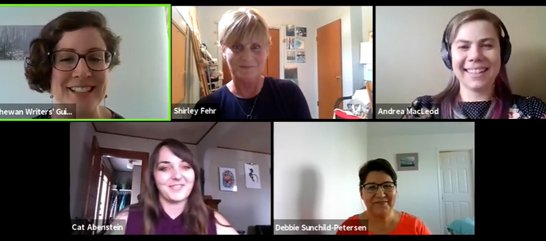
Smooth transition to Online for Saskatchewan Writers' Guild
In this issue
 Engage - Volume 11, Issue 1, Fall 2020
Engage - Volume 11, Issue 1, Fall 2020
Related Programs
Writing is a lonely pursuit. As Saskatchewan Writers’ Guild Executive Director Tracy Hamon puts it, “writers are used to solitarily sitting in front of their computer – happily, I should hope – writing word after word.” So when the Covid19 pandemic hit, isolation on a daily basis was nothing new.
The Guild was already one step ahead of the curve. As an organization with members all over the province, rural as well as urban, the Saskatchewan Writers' Guild (SWG) had already been experimenting with delivering programs online. A regular lunchhour talk, for instance, was delivered to a live audience at the Guild’s Regina headquarters, but also streamed live on Facebook and turned up later on YouTube. Hamon notes, “We’d just had a successful launch of a Virtual WriterinResidence program (aimed at rural members) before COVID19."
But the approximately 600 member, provincial writers' organization, the oldest in the country (it celebrated its 50th birthday last year), has many other programs and faced the challenge of finding ways to keep delivering them.
“Once we made it through the first few months of uncertainty, with cancellations and working from home, we started to focus on what we could do moving forward,” Hamon recalls. “Some of our programming we didn’t have to change” —for instance, the Guild’s print publications, such as Freelance and Grain, and even the weekly Ebriefs, delivered via email, continued to function as usual. But many things did require change.
In many ways, living through the pandemic has been more a positive experience than a negative one for the Guild.
“We’ve always been working towards building more online programming so that we could help remove barriers for writers without access,” Hamon says. “In a way, COVID19 assisted us in figuring out how and what to deliver in online quality programming. It also enabled many of our facilitators and members to gain new skills.”
Guild staff “started looking at our programming with new eyes—by seeing change as an opportunity to respond differently and more inclusively.” Hamon credits her staff of seven (five fulltime) with doing “some really amazing work” while faced with unprecedented challenges, in a climate where thinking “outside the box” is the new normal. Staff “continue to respond on a daily basis to the current climate. They are imaginative with the programming and services, and they’ve learned to be nimble. Our mantra is: ‘if we can’t do that, then we’ll try this.’”
Response to the “new” SWG from members has been encouraging, Hamon says.
“Moving online helped us to increase our presence in isolated and rural areas, and those members are responding enthusiastically.” The Guild’s online views [website and social media] increase steadily, including those from writers elsewhere in the country who aren’t members.”
With restrictions in Saskatchewan easing considerably as summer wore on, Guild staff started “doing a bit of double or hybrid programming—still offering mainly online, but keeping the door open to the possibility of some inperson programming.”
The annual conference in late October in Regina will be a blend of online and small inperson events. “As we move into fall, we’re becoming quicker with responding with new programming ideas and subsequent events,” Hamon says.
And, of course, writers keep on writing, no matter what, so the demand for the kind of support the Guild provides hasn’t abated. If anything, it’s increased.
Saskatchewan Writers' Guild recieves operational funding from Sask Lotteries.

